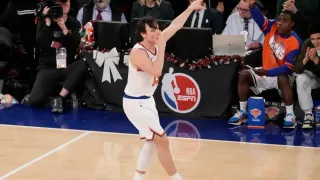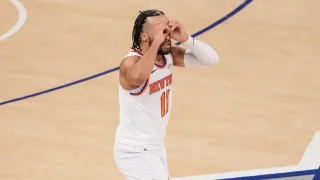June 19, 2020
'Have You Never Had an Evil Aunt?' :: Ryan Landry on Roy Cohn, Documentary Appearance
Kilian Melloy READ TIME: 7 MIN.
Ryan Landry - the founder and chief creative force behind theatrical troupe the Gold Dust Orphans - has, since the late 1990s, kept audiences in Boston, Provincetown, and New York rollicking with laughter at his witty, campy movie mashups, parodic theater productions that Landry writes and often stars in. Along the way, Landry has collected plaudits and prizes, among them Elliot Norton Awards for outstanding productions. Landry, who writes the scripts for his shows, also received The Elliot Norton Award for Sustained Excellence in 2015.
(As a matter of full disclosure, this correspondent is a member of the Boston Theater Critic Association, the organization that produces the annual Elliot Norton Awards honoring Boston area theater.)
Boston theatergoers who tune in to the HBO documentary "Bully. Coward. Victim. The Story of Roy Cohn" might be astonished to see Landry appear for a few minutes to talk about his own strange encounters with the notorious lawyer, who was gay in his personal life and vociferously anti-gay in his career.
Landry describes being picked up by a handsome young man who drove him to an isolated house where Landry sat waiting. But rather than the expected session of sex for hire, Landry says, Cohn engaged him in a conversation about art and music. When he was brought back for a second visit, Landry goes on to relate, he made so bold as to ask whether Cohn wanted sex as well as conversation - and was promptly sent packing by an indignant Cohn.
Watching the review screener for the new HBO Roy Cohn documentary in the midst of the COVID-19 crisis – and now the nation-wide protests that Cohn protege and current American president Donald Trump has exacerbated with his usual divisive style – has been a surreal experience. Indeed, one could feel the ghost of Roy Cohn is hanging over America with the same cold, sinister smile that appears on his face in photos of him used in the documentary.
The director of "Bully. Coward. Victim." is Ivy Meeropol, the granddaughter of Julius and Ethel Rosenberg. For those unfamiliar with the story, the Rosenbergs were a Jewish married couple that Cohn, fresh out of law school, helped get convicted and executed under charges that they provided the Soviet Union with American nuclear weapons secrets. The Rosenbergs' descendants have contested Cohn's assertion as to their guilt, with their son - and Meerpol's father - Michael Meerpol going so far as to challenge Cohn to sue him for defamation in order to get the courts to re-examine the case. Cohn never took the bait, but the documentary reveals some of what Cohn supposedly did, and why, with regard to that case.
Curious to know more about his Cohn encounters, and about Landry's experience contributing to the documentary, EDGE reached out via email. Here's what Ryan Landry had to say.
EDGE: Are you staying safe in this time of strife and plague? Is this shit show amping your creative juices?
Ryan Landry: I am indeed. And the reason for that is painting. If I didn't have the necessary task of going out to the studio (which as by the way, was just three months ago "my writing room") and painting every single day, I would probably just gobble up a bottle of pills, down a bottle of bourbon, order up some stainless steel razor blades and a retro-inspired clawfoot bathtub off Amazon, and check myself out of this madness "toot suite." Thankfully, I now have the blank canvas on which to dump my never-ending dream world, where it was once the printed page.
EDGE: How did you come to appear in the doc? Did Ms. Meeropol or a producer of the film seek you out?
Ryan Landry: Supposedly, Ivy was already familiar with my shows as she'd been a regular visitor to the Cape and had been coming to see me for years. While gathering research for the documentary, a mutual friend suggested that she talk to me because they had somehow remembered something about me telling the story of meeting Roy Cohn back in the late '70s. She wrote to me asking to meet, and that was that.
EDGE: Audiences familiar with your theater work – much of which consists of parodies of gay and camp pop culture movies – might see you in the documentary talking about being a hustler in the 1970s and be surprised. Was this a matter of survival sex work? Was it a way of exploring certain aspects of human sexuality and social attitudes around sex and commerce? Or were you perhaps operating according to the adage that a writer has to embrace everything in life omnivorously in pursuit of experience and greater understanding?
Ryan Landry: Hahaha! It was a matter of not wanting to wait tables!
EDGE: Fair enough... The recollections you share are that you were "hooking" at a bar when you were approached by a good-looking young man who drove you to a house in a secluded area. Roy Cohn was waiting there – but not for sex; the way you describe him, Cohn sounds like a maiden aunt, which is I think the very word you use. But over and over again in the documentary, people who knew him – even his own cousins – refer to Cohn as "evil." Did you get a sense of that? Did he strike you as evil or creepy?
Ryan Landry: Have you never had an "Evil Aunt?" I have! They sit there in their bathrobes pretending to be your friend while you fix them tea and pour your heart out. They smile and nod and sympathize with everything you say. That is until your mother comes home, and then "Auntie" pulls her aside and lays out everything you've been up to in spades! Lol!
Yes, Roy Cohn was creepy. But then, so were most of the "Johns" back then who all seemed to exist on steak, gin, and poppers. I was not a threat to him, and therefore never felt his teeth at my neck. Remember, I was just another dumb kid with wide-open eyes and a remarkably tight "budget."
EDGE: You recall having a conversation with him about music. Was he well informed? Did he seem someone who appreciated art in the way someone you think of as sensitive – and not evil – would appreciate art?
Ryan Landry: Though I would think his knowledge of music was extensive, I think with Cohn it was all about cross-examination. He really had no interest in your interests. It was all about summing you up and finding the holes in your story. Machiavelli had nothing on Miss Roy Cohn.
EDGE: You recount being taken back to the house for a second evening with Cohn, by which time you felt that you and he had got to be friends. Do you mean this in an affectionate sense, or is it a more general sort of sense?
Ryan Landry: I don't think any two people become "friends" in the tenth meeting, let alone the second. But back then I wanted to be everyone's friend. I wanted to learn everything I could about... well, just about everything.
I, of course, had no idea who he was at the time. I doubt that I would have even understood, back then, the volume of his crimes. I simply noticed some records that he had stacked against a wall and thought it would be fun to talk about them. This was not me meeting Satan himself. I was not thinking to myself, "What a fascinating stranger!" It was just another moment in my already chaotic journey through life, and he was just another older man with power. It was also forty years ago.
EDGE: What's odd about this encounter is that when you were brought back for a second visit and ventured to ask Cohn about whether sex was expected to be part of the evening, he got indignant about it. So was there really no sexual spark there? Did you feel he was really just looking for some companionship?
Ryan Landry: Take a good, hard look at the lizard-like mascot for "Geico Auto Insurance" and tell me if you feel a "spark."
Looking back, I think that he knew exactly what I was there for, even when I didn't. I was there to be "reviewed" before I went sent upstairs to have sex with his boyfriend.
EDGE: With what we now hear about Cohn – the way he's portrayed in "Angels in America," the way he's been presented as a mentor to Donald Trump – do you feel that we're getting a pretty accurate picture of the man? Or are some things perhaps being left out?
Ryan Landry: I really can't say, as I must have spent (collectively) no more than two hours with the man. I do think, however, especially after watching footage from several documentaries (and talking with others who knew him far better than I), that he was definitely a groundbreaker when it came to self-preservation, throwing open the doors to this new phenomenon of taking joy in selfishness, greed, and, most importantly, pride while wearing the badge labeled "Asshole for all Eternity."
EDGE: What are you working on currently? Has COVID-19 affected your plans for the upcoming theater season and what projects are you preparing for eventual production?
Ryan Landry: I have gone back to painting (temporarily), and this has turned out to be one of the best decisions I have ever made. Not only is it my only source of income but also my paintings seem to have "taken off," as the young people say. I've sold over fifty of them in the past three months, and have happily accepted offers for solo shows in both Upstate New York and Northampton.
As far as theatre goes, the Orphans and I plan to return to the stage this upcoming holiday season with "A Tiger Queen's Christmas." I don't think I need to explain how we came up with the title. We love our new theatre in South Boston, and the folks at the Lithuanian Club can't wait to have us back. So all in all, God (or Goddess) willing, we will be back to make you laugh, think and feel in early December.
Until then, batten down your hatches because that half baked ham in the White House has plenty of tricks up his sleeve as we approach the next election. Though I have never spent five minutes with Trump, something tells me that his stupidity and lack of soul may prove far more dangerous than anything Roy Cohn could ever dream up.
For more information on The Gold Dust Orphans, go to their official website.
The documentary "Bully. Coward. Victim. The Story of Roy Cohn" is available now at HBO.






